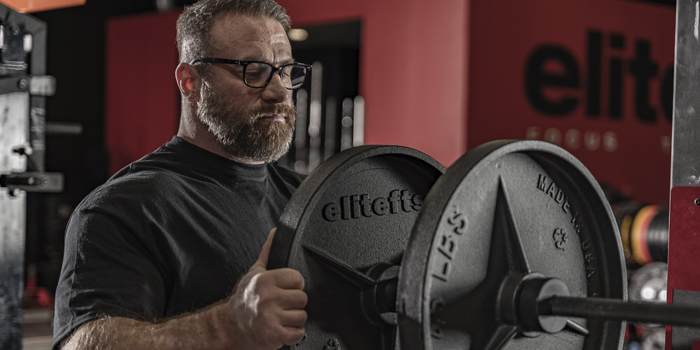
Overtraining? Deloads? Catchwords?
It sure seems like there are a lot of catchwords and phrases in the fitness, lifting, and strength world. There are more fads and people coming up with new thoughts, equipment, exercises, etc., than ever before. The funny thing is, from my experience and being at the highest level of strength training possible, it is just a lot of bullshit.
Strength training is usually pretty simple once you break it down and understand it. Sure, being at the highest level is a bit more complex; you have to sacrifice more and work that much harder while the smaller details get more critical. But that is such a small minority of the strength, fitness, and lifting world.
Two catchwords that continue to make me shake my head are overtraining and deload. Sometimes I think people use them because they think it makes them sound intelligent.
What is Overtraining?
Simply put, overtraining is working beyond your ability to recover. Is overtraining a bad thing? Hell no, it is not a bad thing, but it sure can be. We get stronger by stressing our bodies and then letting them recover. So really, we get stronger when we recover from said stress. If I wanted to be an asshole, I could say I am overtraining after each training session and that I need to deload that night. Rinse and repeat!
RECENT: Future Self, Don't Forget Your Past
But I am not writing this to argue or change your mind. I am pointing out that overtraining is a broad word that can be good and bad. Sometimes, we must overtrain to get stronger or push through barriers. Overtraining can give us that extra stress we need to see progress. It can push our entire bodies, from the central nervous system to the ligaments, tendons, muscles, and especially our mental strength.
Think about it, if you start a job as a carpenter, you will be sore as shit the first week or so. You will be so tired and beat up the first few days that you'll still be sore even if you get tons of sleep. You're overtrained, but it does get better. Your body will eventually catch up, thanks to long weekends off and your body’s natural ability to adapt to stress. Before you know it, you’re handling the workload easily.
Look at the special forces in the military. They have some horrible things they put troops through. For weeks, they beat guys down and overtrain them. They have a reason, though, and afterward, they allow them to rest up. In the end, they are way stronger.
It is not that overtraining is bad; it is more about the duration and depth of the overtraining and the recovery afterward.
What is a Deload?
Simple, it is doing less load than you have been doing. In terms of weights, this can be lighter weights, less total volume, or even shorter durations. I think I should add another word I like to use: unload. An unload is doing no load at all. You have unloaded it all, and now you're doing nothing.
Is a deload bad? No, not at all. It all depends on why you deload, how long it is, and how much you deload. These are just words, and throwing them around does not mean much. We must look beyond the words and ask why we are doing these things.
In general, these words should almost always be used in conjunction with a reason.
Why are you doing a deload?
“Because I am overtrained.”
Why are you overtrained?
“Because my load outweighed my recovery, so I need to deload.”
They are intertwined and always affect each other. Do those two statements seem as simple to you as they do to me? It is just simple math of addition and subtraction. So if your training and recovery are balanced, you’re not overtrained, and there is no need for a deload. If training exceeds your recovery, you will be overtrained at some point. When and if overtraining happens, you will need that deload until the body recovers.
Find Balance, See Better Results
The goal is a balance between training and recovery. First, we need to understand that balance does not mean perfect, equal balance. I see it like an old pendulum or a balance scale like Lady Justice holds. We do not want one side of the scale to hit the ground or tip the hell over. I tipped that bitch over in my lifting career, and it flew off the table. This takes you to a place no one wants to go, hindering my strength. We also do not want the scale unbalanced either way for too long.
Second, we need to understand that once we get into a state of overtraining, there is a gradual downslope that turns into a cliff. Meaning that a little bit of overtraining is not bad, but the deeper you get in, the faster it can go very bad. On the flip side, I am not against “undertraining” to let the body fully recover, but again too little unloaded training will slower gains and even strength loss.
Ego is the Enemy
Even though this is an easy concept, we are humans, which throws a big fat wrench in the works. Not too many people can be 100% honest with themselves. So when we ask if we are overtrained or undertrained, we need the truth, which lifters struggle to answer honestly.
I am going against society, but men and women are different. Men have a harder time being honest about this than women because men generally have enormous egos. We do not want to hear we need to back off, and we especially do not want to think we can’t handle the training we are doing. We take it as an insult to our manliness, “Oh bullshit! I am not overtraining, and in fact, I can handle even harder training!” I can’t tell you how often I have said this or something like it. I also can’t tell you how long it took to get past this, but I can tell you it was a long time. It was also hard as hell. I continue to see lifters looking at it from the wrong perspective.
It is not about what you can toughen through or how far you can push yourself. It is about what is going to increase your strength the most in the most efficient way. If we are doing everything we can to recover, then the facts are the facts. Lifters recover at different rates, which is the way it is. We all have different genetics, which is fine. What is important is that we use our brains to get the most out of our bodies.
Am I doing everything I can to increase my recovery? This is a question I rarely hear people ask. Most lifters want to know about programming or listen to stories about how intensely others have trained. But I want to hear stories about how hard lifters work at their recovery. Pushing in the gym is easy and fun; I love that shit. Recovery is boring and frustrating. You must look at the other side of the spectrum to train hard with great intensity. You need to recover with the same hard work and intensity you train with. It is not just about doing what you enjoy or like to do. At least not if you have big goals and want to reach your potential. There is a whole article for another time in here, but let's say recovery is just as crucial as training.
Are You Overtrained? Should You Deload?
In the end, overtraining and deload are becoming catchwords lifters just throw around. They are words lifters need to know and, even more importantly, they need to understand. For the best gains in strength, we must have our training equal to our recovery. Over the long haul, these two things will fluctuate, balancing more to one side and then the other. We regulate these swings by overtraining and undertraining. We use deloads and even increased loads to rebalance the scale. The faster we recognize and regulate these swings, the less chance of going too far in either direction. This, in turn, allows us to continue making strong gains.
The best path to superior strength is through the mind. I have said it before and will continue to; the mind controls the body. Every lifter's goal should be to increase knowledge about weight training. Do not make the mistake of acting like a strength athlete, which seems to have become very popular in our social media world. Walk the walk and talk the talk. This means taking the time to understand words before you use them. Take the time to understand how they affect you and how to use them in training. I guarantee more knowledge will equal stronger lifts. Strengthen the mind, and the body will follow.
Chad Aichs is a world-class and elite powerlifter in the SHW division. He began training seriously for powerlifting in 1999 in Sparks, Nevada, where he currently trains at American Iron Gym. In the ten years since he started, Chad has proven to be one of the strongest lifters in the world. His best lifts are an 1173 squat, 821 bench press, and a 755 pull. Aichs' best total is 2733, which makes him one of the top lifters of all time.










